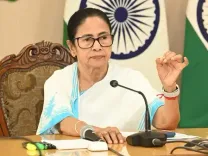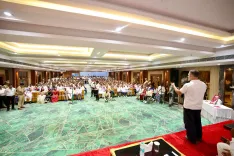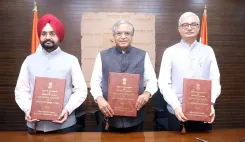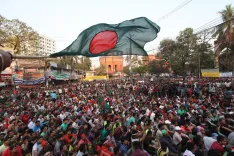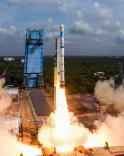Is Karnataka Seeking Electric Buses Under PM E-Drive? Centre Responds with Assurance!
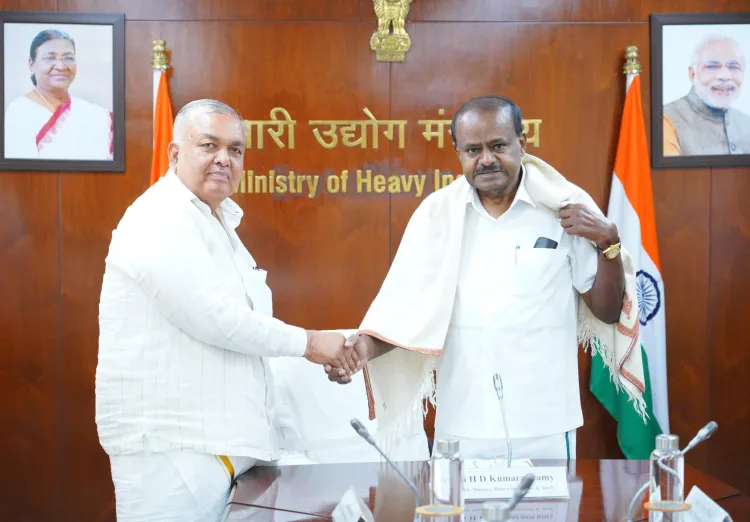
Synopsis
Key Takeaways
- Karnataka has formally requested electric buses under the PM E-Drive initiative.
- The initiative aims to allocate 14,000 electric buses to improve urban public transport.
- The budget for the program is Rs 10,900 crore over two years.
- Union Minister H.D. Kumaraswamy has assured complete support from the Centre.
- Infrastructure development, including charging stations and bus depots, is also a focus.
Bengaluru, May 16 (NationPress) The Union Ministry of Heavy Industries has formally received a proposal from the Government of Karnataka requesting the allocation of electric buses as part of the centrally sponsored PM E-Drive initiative. On Friday, Karnataka Transport Minister Ramalinga Reddy presented the state's appeal, emphasizing the necessity for improved urban public transportation systems in major cities.
In a positive response, Union Minister for Heavy Industries and Steel H.D. Kumaraswamy engaged in discussions with senior officials from the Ministry and assured the Karnataka administration of complete support from the central government, as stated by an official.
The Union Minister confirmed that the allocation process is already in progress, with electric buses being provided to Karnataka in a phased and prioritized approach.
“I will ensure that Karnataka receives all due support from the government of India,” stated H.D. Kumaraswamy. “Under the visionary leadership of Prime Minister Narendra Modi, we are revolutionizing public mobility across India. Karnataka will undoubtedly receive buses under the PM E-Drive initiative.”
As part of the PM E-Drive initiative, a total of 14,000 electric buses are set to be allocated to 9 major cities. Discussions between the Union and state governments have also included essential infrastructure, such as charging stations, bus depots, and vehicle maintenance systems. Officials from both sides examined implementation models to ensure a swift rollout across designated urban clusters.
The Union Minister emphasized: “We are not merely distributing buses — we are constructing a cleaner, smarter, and more inclusive transport future for the people of India. Karnataka Transport Minister Ramalinga Reddy has my complete cooperation as well as that of the Ministry.”
The PM E-Drive initiative, initiated under the guidance of Prime Minister Narendra Modi, aims to enhance city bus operations with 14,028 electric buses. The program has a budget of Rs 10,900 crore over two years, from April 1, 2024, to March 31, 2026.
The Ministry of Heavy Industries is dedicated to fulfilling this transformative mission in partnership with all state governments and stakeholders, as noted in an official statement.
Meanwhile, participants from India’s automotive sector convened with Union Minister Kumaraswamy on Friday for an extensive stakeholder consultation focused on accelerating India’s transition to clean mobility and boosting electric vehicle (EV) adoption.
During this interaction, the Minister engaged with industry representatives regarding India’s increasing EV penetration, strategies for promoting clean air, and methods to bolster the domestic manufacturing ecosystem.
This discussion was aligned with Prime Minister Modi’s vision for a green, self-sufficient, and $5 trillion economy, where clean mobility serves as a catalyst for transforming urban infrastructure and reducing emissions.
The Minister reiterated that the Ministry of Heavy Industries is committed to national objectives of achieving net-zero emissions, Make in India, and Atmanirbhar Bharat, with EVs at the forefront of this strategy. He highlighted that the Government of India’s policies are designed to foster a globally competitive EV ecosystem while addressing local environmental needs.
Stakeholders acknowledged the progress made under schemes like FAME I and II, Auto PLI, ACC PLI, and PM E-Drive. These initiatives have established a robust foundation for India to become a global hub for EV manufacturing and innovation.
Kumaraswamy welcomed industry suggestions and reiterated that stakeholder involvement is crucial for achieving the transformative objectives outlined by Prime Minister Modi. He also encouraged sustained public-private collaboration in areas such as battery innovation, skill development, value chain localization, and the adoption of sustainable technology.
The meeting concluded with a consensus on the need for ongoing dialogue between the Ministry, state governments, and industry to ensure smooth and coordinated policy implementation.

